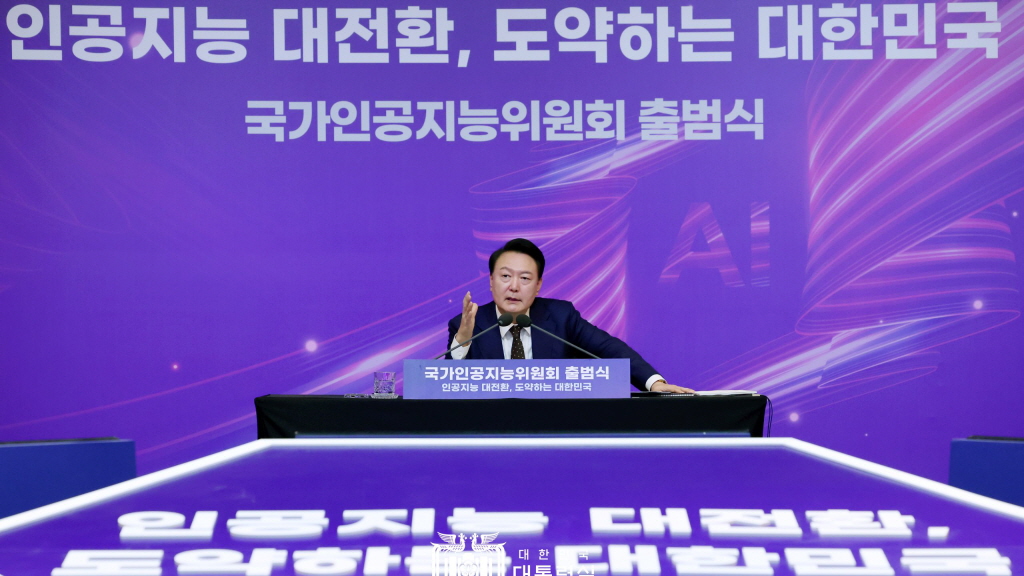윤석열 대통령 주재로 개최된 제1차 국가인공지능위원회(국가AI위원회)에서 국가 AI 컴퓨팅 센터 구축 등 최신 GPU를 현재 대비 15배 확충하고, 2027년까지 4년간 민간이 총 65조원에 달하는 AI 투자를 진행하는 등 세계 3대 AI 국가로 도약하기 위한 청사진을 마련했다.

▲윤석열 대통령이 1차 국가인공지능위원회 회의에서 발언하고 있다.(사진 : 대통령실)
2030년까지 최신 GPU 보유 現대비 15배 ↑
AI 도입률 산업 70%·공공 95% 달성 본격화
윤석열 대통령 주재로 개최된 제1차 국가인공지능위원회(국가AI위원회)에서 국가 AI 컴퓨팅 센터 구축 등 최신 GPU를 현재 대비 15배 확충하고, 2027년까지 4년간 민간이 총 65조원에 달하는 AI 투자를 진행하는 등 세계 3대 AI 국가로 도약하기 위한 청사진을 마련했다.
정부는 26일 포시즌스 호텔 서울에서 국가 AI 위원회 출범식을 개최하고, 윤석열 대통령 주재로 제1차 국가인공지능위원회 회의를 개최했다.
이번 회의에서 정부는 AI G3 국가 도약을 통해 글로벌 AI 중추국가 실현을 비전으로 △국가 AI 컴퓨팅 인프라 대폭 확충 △민간부문 AI 투자 대폭 확대 △국가 AX 전면화 △AI 안전·안보 확보 등 4대 AI 플래그십 프로젝트와 AI 생태계 핵심인 △스타트업·인재 확충 △기술·인프라 혁신 △포용·공정기반 조성 △글로벌 리더십 확보 등 4대 분야 정책 추진방향을 제시했다.
우선 정부는 현재 보유한 최신 GPU 규모를 15배 이상 확충(2030년까지, 2EF 이상)하고, 국산 AI 반도체 조기 상용화를 지원할 계획이다.
민·관 합작투자를 바탕으로 최대 2조원 규모의 ‘국가 AI컴퓨팅 센터’를 구축하고 저리대출 프로그램(2027년까지)을 통해 민간의 AI 컴퓨팅 인프라 확충을 뒷받침한다.
또한 추진과정에서 NPU, PIM 등의 국산 AI 반도체를 도입, 특화된 HW·SW 기술개발 및 적용 등을 통해 국내 AI 컴퓨팅 생태계를 육성한다.
올해부터 4년간(2024∼2027) 민간은 AI 분야에 총 65조원 규모 투자를 단행하고, 정부는 관련 세제 지원을 검토하고, 대규모 펀드 조성 등 정책금융 지원을 확대한다.
국가전반의 AI 大전환도 추진한다. 먼저, 제조·금융·의료바이오 등 AI 도입 효과가 높으나 AI전환이 더딘 8대 산업별 AX(AI+X) 대책을 수립·추진하고, 범정부 AI 공통기반 구현 등을 통한 AI 활용역량 강화로 안전·재난·보건 등 공공부문 18대 분야 국민체감 AI서비스(공공 AX)도 창출할 예정이다.
이러한 국가 AI 전면화로 2030년까지 산업(70%)·공공부문(95%) AI도입률을 제고하고, 우리나라 경제 체질전반을 AI로 개선해 총 310조원 규모의 경제효과(2026년 기준)를 창출해 나갈 계획이다.
전세계적으로 딥페이크 범죄, 사이버 위협 등 첨단 AI로 인한 위험이 확대되며 AI 안전·안보의 중요성이 부각되고 있다.
이에 고도화된 AI 위험에 체계적으로 대응하는 국가 전담기관으로 ‘AI안전연구소’를 올해 11월에 설립하고, AI발전과 안전·신뢰를 균형 있게 달성할 ‘AI기본법’을 연내 제정토록 추진한다.
이와 같은 프로젝트 추진을 위해 정부는 2030년까지 AI 유니콘 기업 10개 육성을 추진하고, AI 인재 양성의 수월화·글로벌화·보편화를 통해 2030년까지 20만 AI 인재 확보를 추진한다.
또한 최고 기술 선도국과 기술협력을 확대하고, 미래 AI 新 시장인 온디바이스 AI 경쟁력 확보를 추진한다. 여기에 저지연·저전력·Edge 네트워크 혁신 등 AI 向 네트워크 고도화를 추진하고, ‘국가기간전력망확충 특별법’ 제정 등을 통해 AI 트래픽·전력 수요 증가에 대응한다.
지속 가능한 AI 발전 및 확산을 위해 ‘디지털포용법’ 제정 및 부당한 차별이나 프라이버시 침해방지 방안도 마련한다.
마지막으로 AI시대의 새로운 쟁점인 AI 책임·권리 귀속관계 등 기본법리를 정립하고, AI 자동화 결정시대 개인·취약계층 보호 방안을 마련한다.
더 나아가 글로벌 AI 중추국가로서 선도국·국제기구와 AI협력을 지속 확대하고, 글로벌 AI거버넌스 논의를 주도해 나갈 계획이다.
윤석열 대통령은 “대한민국 AI 3대 강국 도약이라는 원대한 비전과 함께, 이를 실현하기 위한 ‘국가 총력전’을 선포한다”며 “오늘 출범한 ‘국가AI위원회’가 범국가적 혁신 역량을 모으는 민관협력의 구심점으로서 나라의 명운이 걸린 AI 전환을 선두에서 이끌며, AI가 주도하는 미래 30년을 함께 설계하고 실현해 나가자”고 강조했다.

.jpg)